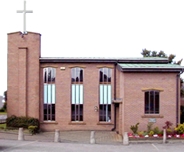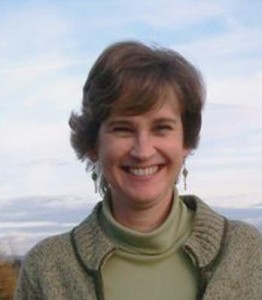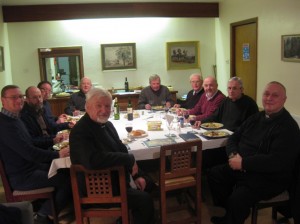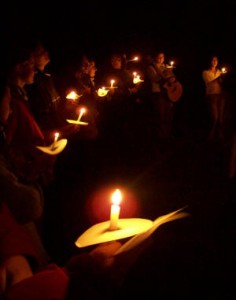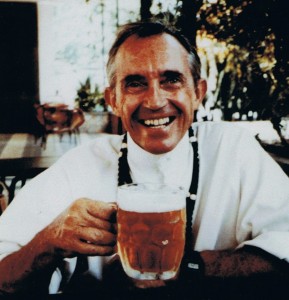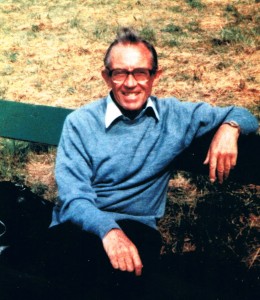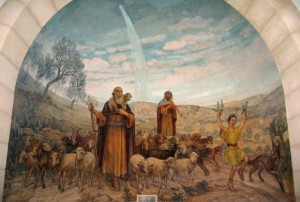To many of us – if not most – the prospect of dying is not an easy situation to face, and this prospect grows even more awesome and terrifying, the younger we are. However, from an early age, we all become aware that it is something every last one of us must face. Because of the aura surrounding death, it is certainly not an easy subject to discuss, but to hide it away, as if it is never going to happen – never to mention it, because it is a long way off – can make the prospect worse, in my view.
The lines of a First World War poem, by A. E. Houseman (1859-1936), carry a message:
Here Dead Lie We:
Here dead lie we because we did not choose
To live and shame the land from which we sprung.
Life, to be sure, is nothing much to lose;
But young men think it is, and we were young.
There are some factors that tend to make us ‘afraid’ of discussing that moment when we leave behind this life on earth – factors that increase the fear we all carry of dying:
-
We do not know when we are going to die.
-
We do not know the manner of our death – whether by natural causes, by accident, or by other means.
-
We cannot know the time-scale of our ‘dying’, whether it is going to be quick, as in a heart- attack, or perhaps, the long-drawn conclusion to a terminal illness.
-
We do not know what is going to follow – not with any certainty – as we have no previous experience of the process.
Now in all of this, I am quite sure in my own mind, that there is a further very important factor and that is faith – faith in God – and in the promises that Jesus made.
Many, of course, refute such beliefs out of hand. For whatever reason, they have no faith in the existence of God, nor in Jesus and in His saving Death and Resurrection. To many, this is just ‘poppy-cock’; many believe there is just no proof; many just can’t be bothered. Whatever their reasons, they face the prospect of death, and what follows must be total nothingness – total blackness – non-existence. Nothing, that is, except a void –something like the proverbial ‘black hole’. How awful!
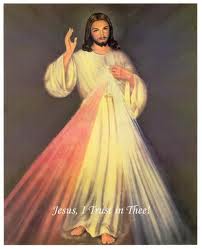 |
Jesus and His Divine Mercy – “Jesus I Trust in You”
How much more enlightening, it must be, to have that faith in the existence of a Supreme Being, Creator of the Universe, and of all things visible and invisible – to have faith in the promises that have been made to humankind – all down the centuries – promises that set out for us, clearly, that there is another ‘supernatural’ life to follow – promises of His love and mercy, to protect us if we try to love Him and do His will – promises that this ‘life after death’ will take us to Him, thus enjoying perfect happiness for all eternity.
I think that there is one further very important consideration to bear in mind – and if we do – it may help to allay some of our fears. Death will certainly come to visit each one of us, at some time in the future. It will bring to an end our humanity, but it will not affect our spiritual side – not in the same way. Yes, we shall lose – leave behind – all human aspects of our life – human bodies, money, possessions, relationships, and all the human emotions, many of which are negative anyway e.g. hatred, envy, power, anger and greed. But, with faith – those who have the gift of belief in a Loving Father – our spiritual side carries on, enhanced a ‘billion-fold’ along a continuum that transcends death – one that has no interruption – no ‘tunnels’ or ‘lights at the end’ but moves smoothly on into a ‘new world’, and one in which those who have made the ‘transubstantiation’ will never have to face death again – one of the ‘preternatural gifts’ – we are promised:
The ‘preternatural’ gifts (from the Latin, praeter naturam – before nature), were bestowed by God on our first parents, Adam and Eve, so called because they were given before the ‘fall from grace’ in the Garden of Eden. They consist of:
IMMORTALITY: Freedom from death, or from the capacity to decay and disintegrate. Absolute immortality is God’s alone. His spirit is eternal by essence. Natural immortality belongs to all spiritual persons, angels and human souls. Their immortality is not absolute because God could annihilate them. Gratuitous immortality was a special grace, given by God to our first parents Adam and Eve, freedom from bodily death, and from separation of soul from body.
IMPASSIBILITY: Complete freedom from every kind of physical evil, such as sorrow, sickness, injury, or death, so that our being cannot suffer or die. Impassibility results from perfect compliance of the body and emotions to the soul.
FREEDOM FROM CONCUPISCENCE: Concupiscence is the propensity of human nature to actual sin as a result of the original sin, which darkened our intellects and weakened our wills. Specifically, concupiscence is the spontaneous movement of our sensual appetite toward what we imagine as pleasant and away from what we imagine as painful. It leads us, in many ways, to turn away from God’s law, God’s perfection, God’s will that we should love him. Once free from this gigantic negative, we can begin to live in God’s perfection.
The Old Testament describes for us the happy state of mankind, before Original Sin, for, in the Psalms (Psalm 8, 4 – 9), we hear of God’s glory and Man’s Dignity (before the ‘fall’):
“What is man that you think of him;
Mere man, that you care for him?
Yet you made him inferior only to yourself;
You crowned him with glory and honour.
You appointed him ruler over everything you made
You placed him over all creation: sheep, cattle, and the wild animals too;
The birds and the fish
And the creatures in the seas, O Lord, our Lord
Your greatness is seen in all the world!”
If Adam and Eve had not sinned, we all would have inherited these preternatural gifts, together with the supernatural gift of sanctifying grace. The souls in heaven will recover these gifts at the end of time. With faith, we can believe that we shall die to our bodies, but live on to recover, eventually, that kind of perfection that ‘approaches’ the perfection of God, himself. In Revelation, (21:4) we read: “He will wipe away every tear from their eyes, and death shall be no more, neither shall there be mourning nor crying nor pain any more, for the former things have passed away.”
Some years ago, a series of thoughts on the subject came into my head and I could not erase them. My ‘release’ was to write a poem in blank verse, consisting of three stanzas, in the last of which I tried in humble fashion to describe my thoughts on what follows death – for those who believe in God’s great love for us. The third verse, below, may help to alleviate some of the dread we carry for the unknown:
The time is now…..
Forever now, my friend, for time is fused
Into a single entity, whereby
Infinity is King, and dark gives way
To light. Newly opened eyes now perceive
God’s Glory, Love and Majesty – Mercy
Towards all human kind, and Grace….. God’s grace
Restores…..breathes life to that so recently
Deceased. Evil, Darkness, shall not more reign,
Nor shall pain and sorrow ourselves invade,
And Death lies corrupt….. powerless….. in his grave.
Fear him not for he provides conduit
To that new life, eternal happiness,
Where souls begin to understand the world
The complex Universe, and Nature now
Includes the Stars within her Rainbow bow’r,
And sits down with the Sun. Endless Space
Without belittling, puts Earth’s Galaxy
Into its place, its micro-cosmic niche
And Time….. its hours….. its days….. at last, stands still.
Goodness and giving, loving and living
Follow Apocalypse Now, that vision
Of God, in which perfection reigns supreme
And nothing, no…..nothing, is left to chance.
Ask why, then, the fear and from whence it came
That fear of Dying and the Life it brought?
The answer lies in our lack of Faith, Hope,
And wavering Trust in the Word of God,
For we are human, after all, and doubt
Magnifies our imperfections. The time
Is now, my friend, to mend our ways, …..believe
With all that strength of mind, and heart, and soul,
In God, His Word and promise of support
Even unto the end of time on earth,
And into Paradise.
Please forgive my very ’human’ attempt to tackle what, for many, is an unmentionable subject. Should my words stand in error, and need of correction, then I apologise and ask forgiveness. Certainly, my exercise has been one solely designed to help, and not to cause any pain or distress.
May God forgive and have mercy on all our souls!
In forwarding the blog by Mailpress, the original formatting is largely abandoned. Should you wish to read and view the blog in its intended format, then please visit the main website.
